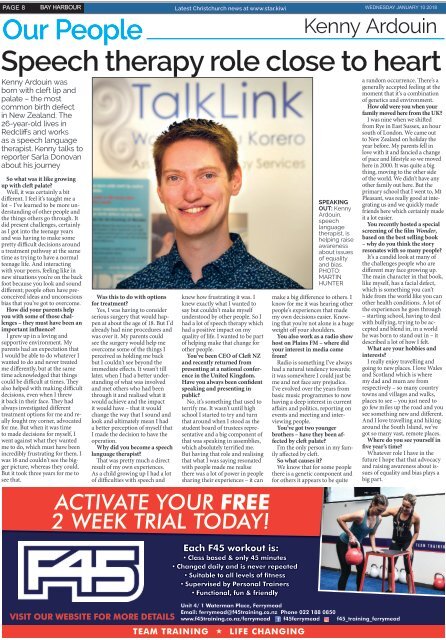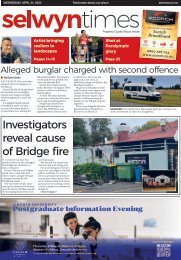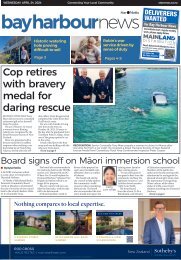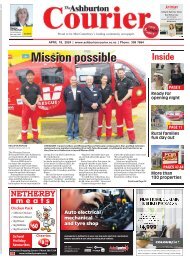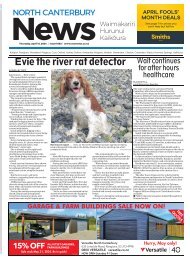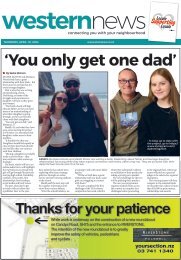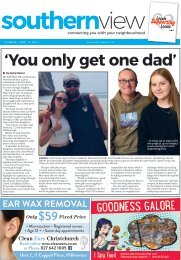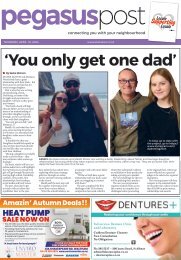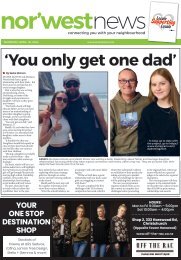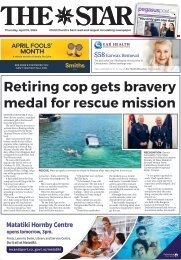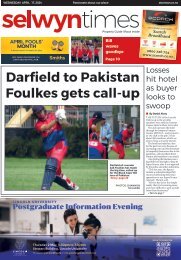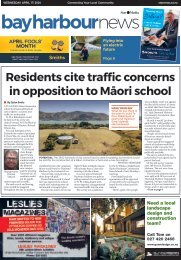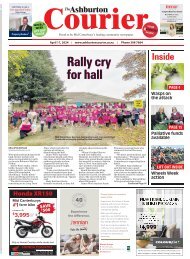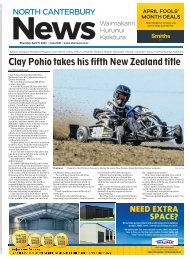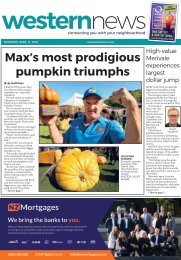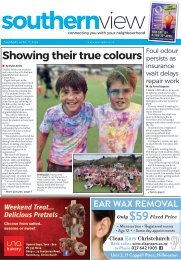Create successful ePaper yourself
Turn your PDF publications into a flip-book with our unique Google optimized e-Paper software.
PAGE 8 Wednesday <strong>January</strong> <strong>10</strong> <strong>2018</strong><br />
BAY HARBOUR<br />
Latest Christchurch news at www.star.kiwi<br />
Kenny Ardouin<br />
Our People<br />
Speech therapy role close to heart<br />
Kenny Ardouin was<br />
born with cleft lip and<br />
palate – the most<br />
common birth defect<br />
in New Zealand. The<br />
26-year-old lives in<br />
Redcliffs and works<br />
as a speech language<br />
therapist. Kenny talks to<br />
reporter Sarla Donovan<br />
about his journey<br />
So what was it like growing<br />
up with cleft palate?<br />
Well, it was certainly a bit<br />
different. I feel it’s taught me a<br />
lot – I’ve learned to be more understanding<br />
of other people and<br />
the things others go through. It<br />
did present challenges, certainly<br />
as I got into the teenage years<br />
and was having to make some<br />
pretty difficult decisions around<br />
a treatment pathway at the same<br />
time as trying to have a normal<br />
teenage life. And interacting<br />
with your peers, feeling like in<br />
new situations you’re on the back<br />
foot because you look and sound<br />
different; people often have preconceived<br />
ideas and unconscious<br />
bias that you’ve got to overcome.<br />
How did your parents help<br />
you with some of those challenges<br />
– they must have been an<br />
important influence?<br />
I grew up in a loving and<br />
supportive environment. My<br />
parents had an expectation that<br />
I would be able to do whatever I<br />
wanted to do and never treated<br />
me differently, but at the same<br />
time acknowledged that things<br />
could be difficult at times. They<br />
also helped with making difficult<br />
decisions, even when I threw<br />
it back in their face. They had<br />
always investigated different<br />
treatment options for me and really<br />
fought my corner, advocated<br />
for me. But when it was time<br />
to made decisions for myself, I<br />
went against what they wanted<br />
me to do, which must have been<br />
incredibly frustrating for them. I<br />
was 16 and couldn’t see the bigger<br />
picture, whereas they could.<br />
But it took three years for me to<br />
see that.<br />
Was this to do with options<br />
for treatment?<br />
Yes, I was having to consider<br />
serious surgery that would happen<br />
at about the age of 18. But I’d<br />
already had nine procedures and<br />
was over it. My parents could<br />
see the surgery would help me<br />
overcome some of the things I<br />
perceived as holding me back<br />
but I couldn’t see beyond the<br />
immediate effects. It wasn’t till<br />
later, when I had a better understanding<br />
of what was involved<br />
and met others who had been<br />
through it and realised what it<br />
would achieve and the impact<br />
it would have – that it would<br />
change the way that I sound and<br />
look and ultimately mean I had<br />
a better perception of myself that<br />
I made the decision to have the<br />
operation.<br />
Why did you become a speech<br />
language therapist?<br />
That was pretty much a direct<br />
result of my own experiences.<br />
As a child growing up I had a lot<br />
of difficulties with speech and<br />
knew how frustrating it was. I<br />
knew exactly what I wanted to<br />
say but couldn’t make myself<br />
understood by other people. So I<br />
had a lot of speech therapy which<br />
had a positive impact on my<br />
quality of life. I wanted to be part<br />
of helping make that change for<br />
other people.<br />
You’ve been CEO of Cleft NZ<br />
and recently returned from<br />
presenting at a national conference<br />
in the United Kingdom.<br />
Have you always been confident<br />
speaking and presenting in<br />
public?<br />
No, it’s something that used to<br />
terrify me. It wasn’t until high<br />
school I started to try and turn<br />
that around when I stood as the<br />
student board of trustees representative<br />
and a big component of<br />
that was speaking in assemblies,<br />
which absolutely terrified me.<br />
But having that role and realising<br />
that what I was saying resonated<br />
with people made me realise<br />
there was a lot of power in people<br />
sharing their experiences – it can<br />
activate your Free<br />
2 week trial today!<br />
SPEAKING<br />
OUT: Kenny<br />
Ardouin,<br />
speech<br />
language<br />
therapist, is<br />
helping raise<br />
awareness<br />
about issues<br />
of equality<br />
and bias.<br />
PHOTO:<br />
MARTIN<br />
HUNTER<br />
make a big difference to others. I<br />
know for me it was hearing other<br />
people’s experiences that made<br />
my own decisions easier. Knowing<br />
that you’re not alone is a huge<br />
weight off your shoulders.<br />
You also work as a radio show<br />
host on Plains FM – where did<br />
your interest in media come<br />
from?<br />
Radio is something I’ve always<br />
had a natural tendency towards;<br />
it was somewhere I could just be<br />
me and not face any prejudice.<br />
I’ve evolved over the years from<br />
basic music programmes to now<br />
having a deep interest in current<br />
affairs and politics, reporting on<br />
events and meeting and interviewing<br />
people.<br />
You’ve got two younger<br />
brothers – have they been affected<br />
by cleft palate?<br />
I’m the only person in my family<br />
affected by cleft.<br />
So what causes it?<br />
We know that for some people<br />
there is a genetic component and<br />
for others it appears to be quite<br />
a random occurrence. There’s a<br />
generally accepted feeling at the<br />
moment that it’s a combination<br />
of genetics and environment.<br />
How old were you when your<br />
family moved here from the UK?<br />
I was nine when we shifted<br />
from Rye in East Sussex, an hour<br />
south of London. We came out<br />
to New Zealand on holiday the<br />
year before. My parents fell in<br />
love with it and fancied a change<br />
of pace and lifestyle so we moved<br />
here in 2000. It was quite a big<br />
thing, moving to the other side<br />
of the world. We didn’t have any<br />
other family out here. But the<br />
primary school that I went to, Mt<br />
Pleasant, was really good at integrating<br />
us and we quickly made<br />
friends here which certainly made<br />
it a lot easier.<br />
You recently hosted a special<br />
screening of the film Wonder,<br />
based on the best selling book<br />
– why do you think the story<br />
resonates with so many people?<br />
It’s a candid look at many of<br />
the challenges people who are<br />
different may face growing up.<br />
The main character in that book,<br />
like myself, has a facial defect,<br />
which is something you can’t<br />
hide from the world like you can<br />
other health conditions. A lot of<br />
the experiences he goes through<br />
– starting school, having to deal<br />
with bullying, trying to be accepted<br />
and blend in, in a world<br />
he was born to stand out in – it<br />
described a lot of how I felt.<br />
What are your hobbies and<br />
interests?<br />
I really enjoy travelling and<br />
going to new places. I love Wales<br />
and Scotland which is where<br />
my dad and mum are from<br />
respectively – so many country<br />
towns and villages and walks,<br />
places to see – you just need to<br />
go few miles up the road and you<br />
see something new and different.<br />
And I love travelling and hiking<br />
around the South Island, we’ve<br />
got so many vast, remote places.<br />
Where do you see yourself in<br />
five year’s time?<br />
Whatever role I have in the<br />
future I hope that that advocacy<br />
and raising awareness about issues<br />
of equality and bias plays a<br />
big part.<br />
Visit our website For More DetAiLs<br />
each F45 workout is:<br />
• Class based & only 45 minutes<br />
• Changed daily and is never repeated<br />
• suitable to all levels of fitness<br />
• supervised by Personal trainers<br />
• Functional, fun & friendly<br />
unit 4/ 1 waterman Place, Ferrymead<br />
email: ferrymead@f45training.co.nz Phone 022 188 0850<br />
www.f45training.co.nz/ferrymead f45ferrymead f45_training_ferrymead<br />
teAM trAiNiNG LiFe CHANGiNG


